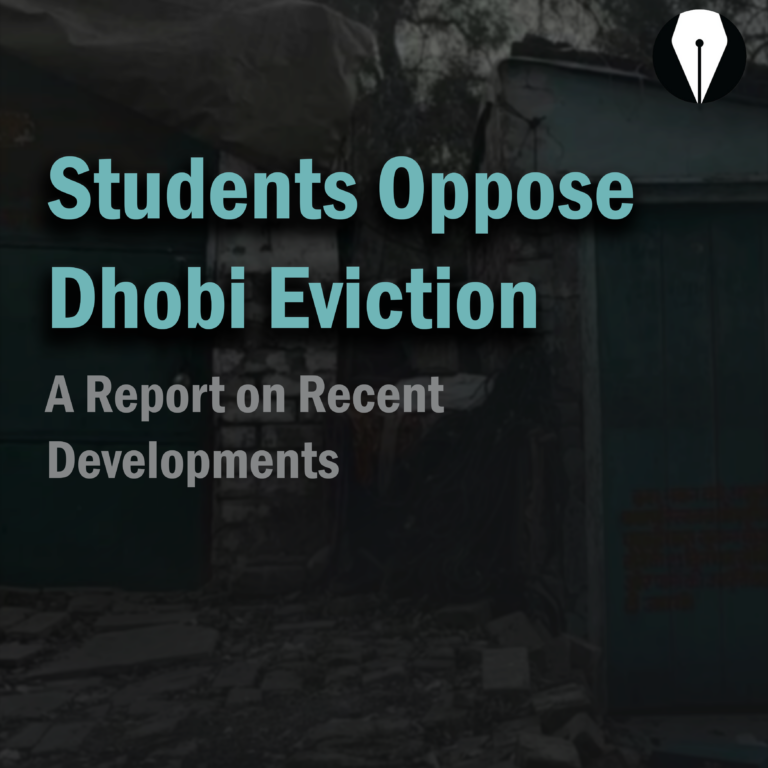On the night of 4th February (Sunday), around forty students from Hall 12 seeked medical assistance in the institute health centre (HC) complaining of stomach ache and vomiting. The physician on duty, Dr. Devendra Kumar attended to these students overnight. This number grew to over 250 by Monday evening. Dr. Kumar said that all of the students that came to HC on Sunday night were in a condition where they should have been admitted but due to constrained resources, he only admitted three to four students whose condition was most severe. The others were kept under watch for a while, given rehydration and were sent back with medicines. Some students also complained of loose motions, a symptom that appears at a later stage in gastritis (the primary diagnosis) which suggested that the condition had progressed much before the students came to HC. This was corroborated by accounts of some students who had been complaining of vomiting since Saturday afternoon.
“Gastritis is mostly caused due to bacterial infection which is found most commonly in milk and meat products gone bad or due to unhygienic kitchen practices. Since not all the students consumed meat, it is most probably due to milk” said Dr. Kumar. He speculated that it might have been caused due to milk that was allowed to stand in the open for too long, wet flour that was not cooked immediately or unclean utensils.
The mess manager too believes that the poisoning was caused by milk since on Sunday evening, when tea was being prepared for the mess workers, it curdled. But he does not think that the spoilage could have happened due to negligence of the mess staff since milk is boiled as soon as it arrives from the vendor in the morning and all precautions are taken to ensure that it is fit for consumption. The warden-in-charge, Prof. Anshu Gaur cited another reason that raises suspicion over milk. The vendor who supplied milk to the mess for drinking, did so at around Rs. 30 per litre as opposed to Rs. 40 to the canteen. No incident has been reported from the canteen in the three years that they have been using milk from that particular vendor. Moreover, if this is compared to the packaged milk price of Rs. 54, it is hard to believe that it was pure milk that was being supplied.
A case of foul play is suspected by the mess manager in this incident. The mess empanelment (tendering for mess operator) for the Hall 12 mess was due on Tuesday and he believes that a particular mess worker was in favour of another mess to replace the current one. He reckons that it might be the case that the worker tried to derail their chances of winning the tender for the mess by orchestrating this episode. The said worker was reported to have been on uninformed leave since Monday and was unreachable till Wednesday when this interview with the manager was held.
Samples of the food served on Sunday were taken but could not be analysed since a laboratory for this purpose was not found. As food samples remain useful only till 72 hours after being cooked, they had to be discarded. Monday onwards, the mess stopped receiving milk from the two vendors that supplied it. Only packaged milk from Amul and Mother Dairy was used for a few days. Only recently was one of the vendors who supplied milk for purposes other than drinking was reinstated. This decision was based on the fact that since the milk from the other vendor had curdled the tea, it was unsafe to take milk from him. Since it is easier to spot adulteration in milk when it is processed to make paneer or khoya, loose milk was considered safe for these purposes.
To prevent such incidents from happening in the future, various steps have been taken by the hall administration. From now onwards, food samples of each meal are taken and refrigerated. This way, if a case similar to this one is reported, it would be easier to investigate the cause. Moreover, Prof. Gaur believes that it acts as a deterrent against unsafe practices of mess workers since they would be fearful of being caught with this system in place. Also, it has been proposed to install a CCTV camera in the mess to keep a check on the mess workers and the protocol followed while handling food.
Some students of Hall 12 reported not having had any milk products since Saturday afternoon and yet experienced symptoms of gastritis. This raises questions about the hygiene standards maintained inside the Hall 12 mess. We were informed by Prof. Gaur that measures like covering of head with shower caps and gloves while serving food are in place but their implementation is entrusted upon the mess manager and kitchen supervisor. A new initiative of installing a wash basin inside the kitchen has been proposed. It is hoped that for every worker who enters the mess, it would be possible for the supervisor to oversee washing of hands but this again is contingent upon the conviction of the manager and supervisor. The hall guardians make regular checks of the hygiene standards in the mess but the personal hygiene is not scrutinised. Until they workers exhibit visible symptoms of an illness, no action is taken. This is the case in most of the other messes across our campus too, where personal hygiene is not as strictly enforced as it probably should.
Even though it seems unlikely that the real cause of the incident will come to light in the absence of evidence, we must use this incident as a wakeup call to implement stricter standards of food safety.
Written by Simrat Singh











